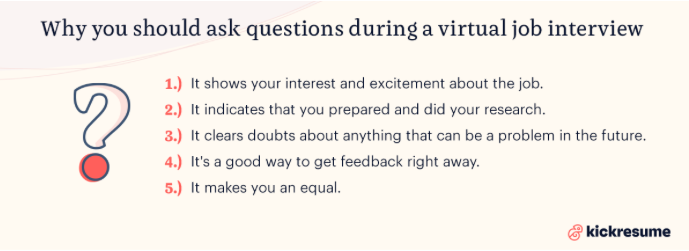Top Remote Work-Related Questions to Ask Companies During Your Virtual Job Interviews
It looks like working remotely isn’t just a trend brought upon by the pandemic. Remote work is here to stay together with all of the modifications of the recruitment processes, such as virtual interviews.
Given that it’s more difficult to interpret your body language and subtle cues through a screen than in person, asking clever and insightful interview questions gives you the chance to let the hiring managers learn more about you.
On top of that, the traditional interview questions about office culture and environment are no longer relevant when talking about remote-based jobs.
Instead, topics like communication or time flexibility should be discussed.
That’s why we present the top remote work-related questions to ask a hiring manager during your virtual job interview.
What is a virtual interview?
A virtual interview is essentially a job interview that isn’t conducted in person. Interviewers usually use video conferencing tools to speak with candidates, who are in a remote location.
Why do recruiters use virtual interviews? Well, what initially started as a way to adapt to the Covid-related measures, is now a well-established hiring process that proved to offer many benefits to both the employer and the employees.
This type of recruiting process reduces the time-to-hire and allows the companies to have greater scheduling flexibility. Additionally, more candidates can be interviewed and the talent pool is no longer geographically restricted.
There are generally three main types of virtual interviews:
- Live virtual interview. This first type is conducted in real time, using video conferencing software, such as Zoom. This makes it very similar to an in-person interview.
- On-demand virtual interview. During this type of interview, an employer sends a set of predetermined interview questions to candidates, which they then record the answers to in their own time.
- AI interview. A new trend in hiring during which candidates must record their answers to timed questions as part of the application process, and then submit the video for an algorithmic analysis of their skills, facial expressions, or speaking tones.
Large companies usually use on-demand interviews as the first round since it’s more efficient, and then invite people for the second round of live virtual interviews. The same usually goes for AI virtual interviews.
Once you get invited for the second round of live interviews, feel free to ask questions. We strongly encourage you to do so, since it increases your chances of being hired.
And, if you want to know what mistakes you need to avoid at virtual interviews, have a look at this quick guide to ensure you get to the next round.

Why you should ask questions during a job interview
Have you ever been at a job interview, and after being asked by the hiring managers if you had any questions for them, you sat there in silence and couldn’t think of any? Pretty awkward, right?
Well, apart from avoiding the imminent cringe, there are actually other reasons why it’s important to ask questions.
- It shows your interest. Someone totally uninterested in the job would probably not ask anything and want to leave as soon as possible. Your questions tell the hiring manager that you’re interested and excited about the opportunity.
- It indicates that you prepared. Good questions show that you have done your research about the organization. That is, of course, only if you really do the digging. Don’t ask about things that are easily searchable.
- You can clear your doubts. It’s better to clear the air about anything that might be a problem for you in the future. A conversation like this will help you as well as them to find out if you’re a good fit.
- It’s a good way to get feedback. You can never really know for sure whether someone will get back to you. Hence, you often don’t really find out why you weren’t a good match. However, nothing is stopping you from asking for feedback right away. If something negative comes up, you have a chance to clear their doubts.
- It makes you an equal. If an interview is conducted only one way, it can sometimes feel like an interrogation. However, by asking questions you can even up your position with theirs and make it seem more like a conversation.
Now that you know why you should ask questions during an interview, it’s time to look at the top questions to ask for a remote position.
Top 10 remote job-related questions to ask recruiters during a virtual interview
A successful work relationship between a remote employee and an employer is largely due to clear, complete, and efficient communication. And, your virtual interview is a good time to start practicing it!
Without further ado, here are the top questions to ask during an interview for remote workers:
A successful work relationship between a remote employee and an employer is largely due to clear, complete, and efficient communication. And, your virtual interview is a good time to start practicing it!
Without further ado, here are the top questions to ask during an interview for remote workers:
#1 Are there fixed or flexible working hours? Can I work asynchronously?
This is a vital interview question for remote workers to ask a prospective employer. If you work on-site it’s normal to have fixed working hours, such as the usual 9 to 5.
However, remote employees often don’t have to be available during fixed hours and rather have an asynchronous working mode. Async work describes a way of operating that doesn’t require employees to be logged on at a specific time or work simultaneously during given work hours.
Hence, asking about this so early will give you an idea of how you should manage your time. Plus, it can also open a discussion about your preferences.
#2 What challenges associated with remote work have you come across during your time at [Company]?
Remote work is still somewhat new. Hence, many companies are still finding some aspects of it problematic. Ideally, you’d want to know beforehand what those aspects are. That way you can decide for yourself whether it’s an issue you can overcome, or if it’s a deal breaker.
Moreover, through this question, you’ll also find out whether they’d addressed issues in the past and how it was handled.
#3 Do you provide any support for remote employees regarding issues with motivation, productivity, and maintaining a healthy work-life balance?
Remote employees often end up working more than they would if they were based in an office. While this may initially sound great to an employer, they should know that this isn’t sustainable or beneficial for the employees’ well-being.
To prevent employee burnout, companies should provide support to make sure their remote workers are maintaining a healthy work-life balance and remain in good physical and mental health.
A company should provide resources such as free virtual counseling or other types of employee assistance. Some ways an employer can ensure this is by limiting communication to working hours and encouraging regular breaks.
#4 How is communication maintained across the entire company, considering the remote nature of the job?
Communication is key, especially for remote-based companies. There’s now a multitude of online communication tools and programs to choose from, and companies often use a specific one or a combination of them.
Apart from learning which tools the company uses to communicate, you’ll also learn how they communicate. Are you expected to be online throughout the whole day? Do you need to message back immediately? Are there mandatory meetings every week?
Moreover, you’ll want to know whether you should report to someone, and if so, how often and to whom. Plus, you should know whether you’ll be a part of a team or a lone wolf.
#5 Can you describe a typical workday for an employee in this position working remotely?
This is one of the best questions to ask about a job offer, regardless of whether the job is remote or not. The hiring manager should tell you about the daily responsibilities and tasks you can expect so that you have a clear idea of what the position entails.
Will you have daily meetings? Or will you work independently for the majority of the day? What do your daily tasks entail? Will you do the same thing every day or are the tasks varied and always a bit different?
#6 Is the company fully remote? If not, what percentage of your employees work remotely?
There’ll likely be a huge difference in the company culture and work environment if you’re the only remote employee versus if the company is fully remote. A general guideline, in this case, is that the bigger the percentage, the better remote work-related issues are handled.
That is, of course, a very general hypothesis. However, it does make sense that if the proportion of remote employees is considerably small, they can often feel left out or forgotten about. Similarly, the organization of the company is usually based on the majority of people, not on a handful of remote employees.
If you find out there are very few remote employees, you should make inquiries about how remote work is managed and ask for more details.
#7 Will I be expected to communicate synchronously with employees in different time zones?
It is one thing to communicate with colleagues working during the same working hours, and another thing when you’re forced to hop on a schedule of colleagues in different time zones.
You should be informed about whether you’re expected to communicate synchronously (i.e. you’re expected to reply instantly or pick up the phone right away) prior to starting your remote job. By knowing beforehand you’ll have a realistic idea of how your daily schedule and working hours will look.
#8 Will equipment be provided for me? Or should I use my own?
Since remote work is, well, done via the internet, your computer and wifi will be your best friends. While some jobs don’t require you to have the fastest processor and the biggest memory, some do.
In case your old laptop isn’t really up for the job, you should probably ask for one. The same goes for a proper headset, a camera, or whatever equipment you might need.
Some companies even provide an equipment stipend, sometimes also referred to as a technology stipend, which is a sum of money given to employees for them to use to purchase equipment in order to make remote working easier and more productive.
#9 How often do remote employees have to come to the office?
Is it once a year? Once a month? Never? You might want to ask this question especially if you live abroad and work remotely from there.
It’s surely helpful to be able to plan your trips to the office well ahead to save money and have your work trips all planned out.
#10 How will the payment of my salary be handled?
A salary is a bit of a touchy subject to discuss during an interview. In this case, however, you’re not asking about the dollar amount, but rather about the technicalities.
It’s especially relevant to ask this question if you’re a remote employee residing in a different country than the company.
Why? Well, since you may need to pay taxes in another country, you should ask how this process is usually handled so you don’t end up doing something fraudulent by accident.
This article was provided by Kickresume;
Klara Cervenanska is a Career Writer at Kickresume, a professional resume builder trusted by 1.4M+ job seekers. www.blog.kickresume.com






